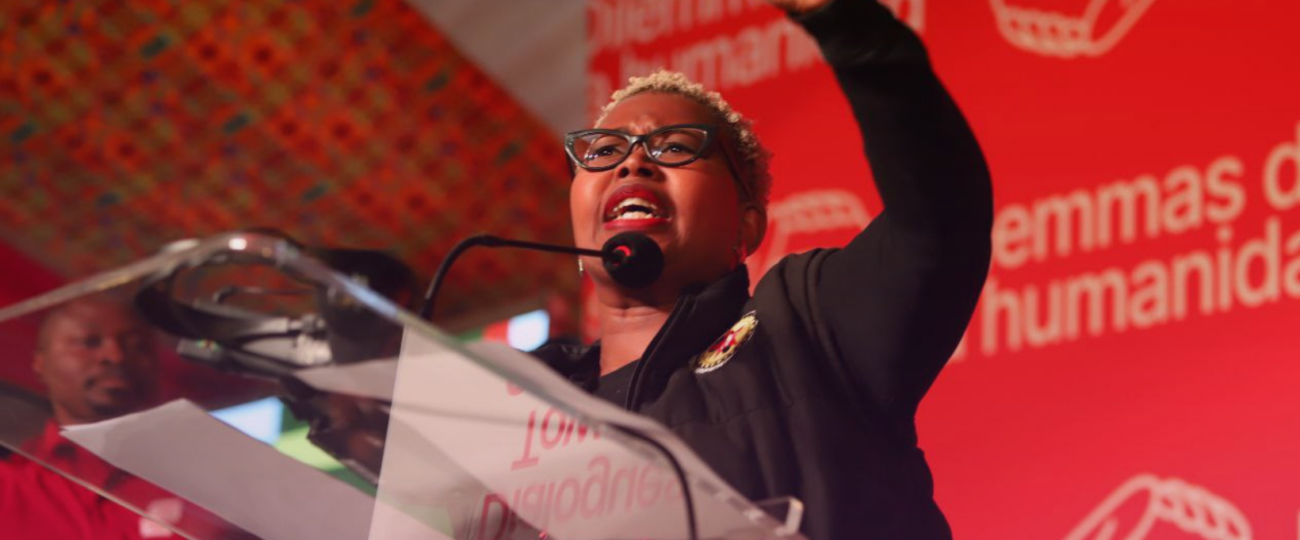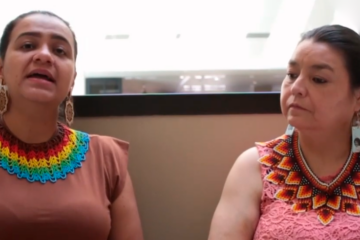Phakamile Hlubi-Majola is the National Union of Metalworkers of South Africa (NUMSA) spokesperson. The union was formed in 1987, during the apartheid regime, and it started by organizing workers in the auto, steel and metal industry. In 2013, during its national congress, the union decided to expand its scope to organize outside strictly metalworkers. Now NUMSA works as an articulation of several other unions along the value chain, such as workers in transportation, infrastructure, the mining sector, the passenger bus sector, aviation, and the energy sector. The union was one of the host organizations of the 3rd Dilemmas of Humanity Conference, that happened in October 2023, in Johannesburg, South Africa.
There was a lot of social unrest in South Africa when NUMSA was founded. Phakamile explains that “it was not even really legal for South African workers to organize, and the demands that they had gone beyond demands of wages and working conditions. The workers realized that for their wages and their conditions to improve, apartheid must be removed”. During this interview, she talks about the history of NUMSA and the workers struggle in South Africa, along with the history of women’s freedom fighters in the country, and the relationship between the South African and the Palestinian struggle.
“What is happening in Palestine right now is unforgivable. The Israeli government, as far as we’re concerned, is an apartheid state.”
Phakamile Hlubi-Majola

Regarding the history of Johannesburg, and its direct relationship with the mining industry, what is the importance of having a workers’ organization in these fields that are so historically tied?
Precisely because of the relation between these fields, now NUMSA also organizes within the mining sector. Mine workers in South Africa continue to be one of the most exploited workers. The industry boomed off the backs and the sweat of the labor of Black workers that were paid less than peanuts and forced to live in dehumanizing conditions, so that the bosses could get rich. This is our crisis as NUMSA with the African National Congress (ANC) [political party in power since the liberation from the apartheid regime]. We wanted our government to take on the demands of the working class and to implement macroeconomic policies that would fundamentally change the lives of the majority of people.
South Africa today is a country with the most unequal society in the world. Our unemployment level is in some cases comparable to countries that are at war. That tells you about the failures of the ANC to transform the South Africans lives. When the ANC government took power, they didn’t use their political power to change the structure of the economy, so that more Black people would be absorbed, and we would have ownership of the means of production. We would have wanted a South African government that would have nationalized the mines and the minerals. Because by doing that, you can use the money that you generated to actually transform the lives of people by funding quality healthcare and free quality education.
The South African government unfortunately has allowed itself to be dictated by the International Monetary Fund (IMF), the World Bank, and all of these others right wing neoliberal institutions. They have also been privatizing a lot of state owned industries, and many of them are actually big employers. Eskom, for example, the only power utility that provides electricity to the country, employs more than 30 thousand people. By privatizing these institutions, what happens is that there are massive job losses. When the private sector gets involved, their agenda is not developmental, but profit driven.
Capitalism is our crisis. Capitalism, which we know is incapable of transforming the lives of the majority of people, is worsening the conditions of the very same people who were fighting for a better life after the apartheid.
During the Dilemmas of Humanity Conference, NUMSA distributed t-shirts with Winnie Mandela’s face on it. Why is she an example to the struggle? What are the connections between her and the work the union have been doing?
When Winnie Mandela died, we described her as the leader of the unorganized liberation movement, the general who led the struggle for freedom. There was a time when many leaders of the liberation movement were in jail. If they were not arrested, they were in exile, being tortured or dead. It created a vacuum. People were concerned that the movement might die because its leaders were in jail, but Winnie was not in jail. She kept the light burning.
She would organize rallies, marches… She was organizing people in the townships and Soweto. She led the struggle. She was very militant and fearless. I don’t know how many times the police arrested, assaulted, and detained her. The very fact that there was so much noise around the regime in the 1980s was because of her and how much she was mobilizing.
But she is not the only women in the struggle. In 1956, we had women organizing themselves to march against the apartheid government, to end what was called a dompas. That was an identity book system similar to what Nazi Germany developed for the Jews in the ghettos. It was a document that was reserved exclusively for Black people, that would limit basically anybody in the country according to where you could be. That document would say you are only allowed, for example, in Johannesburg. It dictated where you worked, it dictated where you lived and where you died. It controlled your entire life. We saw it as part of the dehumanization of the apartheid system. In that year, more than 20 thousand women organized a massive march to the Union Buildings, which was the Parliament at that time, to demand an end to the dompas. When they got there, they made a point to sort of tell the government that “we are not scared of you, we will fight you”.
Now, how are the women’s workers struggles being built in the country?
Trade unions of metalworkers and mining workers are traditionally male-dominated. We definitely have a lot of militant women, but in terms of the numbers, we still out numbered by men, and that’s something we need to change. The demands of women often are like all women everywhere: we want to be safe at work, we want to be free from harassment, we want equal opportunities, equal pay for equal work. Today, in South Africa, women, and particularly Black women, are among the lowest paid.
A highlight of the women’s struggle in the history of NUMSA for me would be in 2019 when workers went on a strike at a mining company called LANXESS, a multinational mining company owned by Germans. What triggered the strike was that a female employee was being sexually harassed by one of the security managers on the mine, and the comrades, her male colleagues, decided to stage a sit-in in solidarity with her to demand that this mine manager was fired. For nine days, they slept underground with her. Their strike caused so much international attention. It took a serious media campaign to the extent where the management in Germany got embarrassed by all the negative coverage.
That strike for me is definitely an indicative of one of the really positive elements of NUMSA in terms of being a progressive organization whose members can sacrifice nine days of their income to make a point about the suffering of one woman who was being sexually harassed. I’m not saying we’re perfect, but we are an organization that has got very strong principles when it comes to the protection of women, of the LGBTQI communities, and immigrants, because our ideology as a trade union is rooted in socialism.
Can you tell us how the struggle for the liberation of South Africa, and the Palestinian struggles are related?
The Palestine issue hits close to our heart. NUMSA has a long history of defending Palestine, and we will continue to defend it. What is happening in Palestine right now is unforgivable. The Israeli government, as far as we’re concerned, is an apartheid state. They are implementing mass ethnic cleansing and trying to wipe out Palestinians. We will defend Palestinians, we believe that it is their right to defend themselves, and they must do what is necessary to free themselves. Israel must be dealt with, it should be sanctioned and banned. We’ve had many campaigns calling for sanctions and for the expulsion of the Israeli Ambassador here [on November 6th, de novembro, the South African government recalled all its diplomats from Tel Aviv for consultation].
Israel should be treated like a pariah State the way South Africa was treated.
There is nothing lawful or moral about what the Israeli government is doing. We stand in solidarity with Palestinian people of West Bank and Gaza. This Dilemmas of Humanity Conference has had a huge focus on Palestine, and that was intentional from the beginning. Our country achieved its freedom not purely on its own efforts, but also because of international solidarity. There were Cuban fighters who came all the way to fight in a war in Angola against the apartheid government. They died, they’re buried here on the continent. South Africa owes the world a huge debt for its freedom, and we believe we have a real responsibility to the people of Palestine to ensure that they also experience freedom, and that it must happen now.




